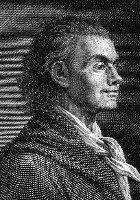Johan Herman Wessel
Johan Herman Wessel Poems
At Smørrebrød er ikke Mad,
Og Kierlighed er ikke Had,
Det er for Tiden hvad jeg veed
Om Smørrebrød og Kierlighed.
...
Der var en liden Bye, i Byen var en Smed,
Som farlig var, naar han blev vred.
Han sig en Fiende fik; (dem kan man altid faae,
Jeg ingen har, det gaae
...
He ate and drank, was never glad,
His boot heels he wore down one side;
Ambition – that he never had,
And finally just upped and died.
...
Lad Andre tænke, sige,
Guld giør os lykkelige;
Jeg fandt mit Himmerige,
Min Pige! i dit Skiød.
...
I, the late Owe Gierløv Meyer,
Did stupid things my life entire,
Though this time I did five of them,
The last of which was quite a gem;
...
Johan Herman Wessel Biography
Johan Herman Wessel was a Norwegian-Danish poet. Some of his satirical poems are still popular. Biography The son of a painter, he was born and raised in Vestby, Akershus, Norway, and was the elder brother of mathematician Caspar Wessel. He was a relative of the naval hero Peder Tordenskjold. Living most of his (bohemian) life in Copenhagen dependent on casual work and weakened by a bad health and drinking Wessel became the popular and admired centre of Norske Selskab ("The Norwegian Society") a very important club of Norwegian literary figures cultivating their national identity in Copenhagen, and writing in classical metres. First of all Wessel is known for his many humorous and satiric verse tales (ed. 1784-1785), referring to man’s foolishness and injustice. Most famous is Smeden og Bageren (“The Smith and the Baker”) about the only smith of a village who is pardoned for manslaughter since the village people need one, while a more superfluous baker is executed instead (there are two bakers, the village only needs one) in order to observe the rules that “life pays life”. In Herremanden (“The Squire”) a man coming to Hell makes unpleasant discoveries of the origin of his own son while Hundemordet (“The Dog Murder”) tells about wrangle about trivial things. The style of Wessel is deliberate elaborate and digressive and at the same time elegant and witty. Another genre is the epigram that he mastered, especially his short, witty, impudent, precise and also self-ironic commemorative poems. Many of them are still quoted. His satirical play Kierlighed uden Strømper (i. e. Love without Stockings, 1772—with epilogue, 1774) is a generic parody of neoclassical tragedy; it takes place in a daily milieu of banal conflicts but observes the formal rules of “heroic language”. It is still performed. Another play is Anno 7603, written in 1781. It has a low literary value, and it has never been performed—it is held in such low esteem that it is often omitted from lists of his works —but it has some cult status since this is one of the first examples of time travel in fiction. The main characters, Leander and Julie, are moved by a fairy to a future (AD 7603) in which gender roles have been switched and only women are allowed to fight in the military. The traditional restaurant Wesselstuen in Bergen, Norway contains many of his works as decorations.)
The Best Poem Of Johan Herman Wessel
Kierlighed Og Smørrebrød
At Smørrebrød er ikke Mad,
Og Kierlighed er ikke Had,
Det er for Tiden hvad jeg veed
Om Smørrebrød og Kierlighed.
